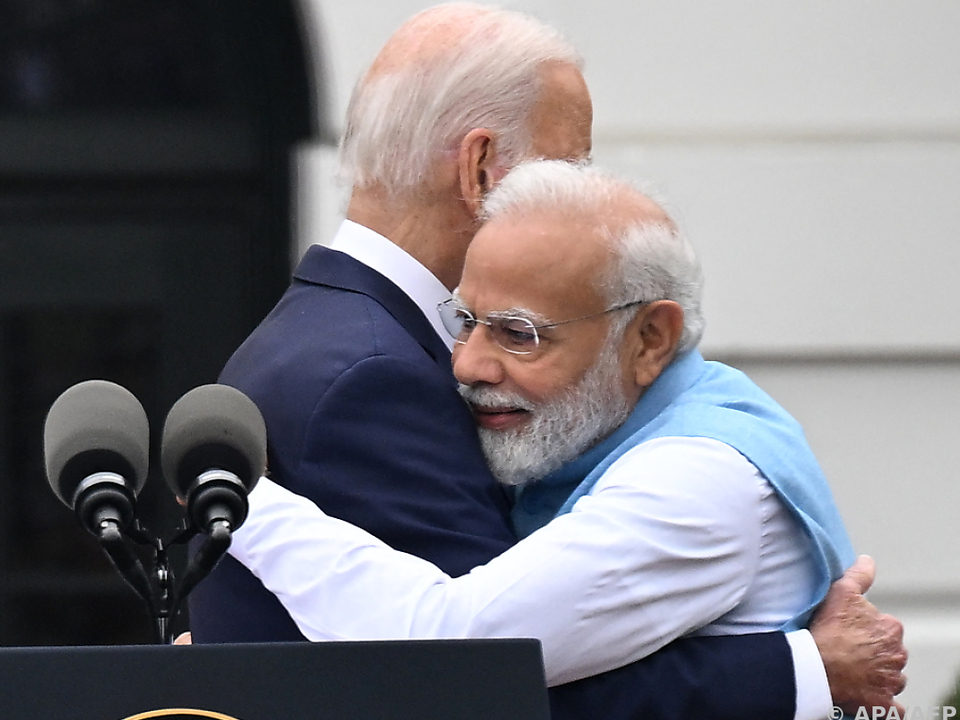President Joe Biden wooed the world’s most populous nation with a grand reception of Indian Prime Minister Narendra Modi as state guest to the US. At the bilateral meeting between the two on Thursday, according to the US side, several economic and military agreements should be concluded, including the sale of US drones to India.
The Biden administration is aggressively seeking to tie India in tighter as a major player in the Indo-Pacific and on the international stage. However, many politicians from the US Congress expressed concern about the human rights situation in India.
Biden said he believed “that the relationship between the United States and India will be one of the defining relationships of the 21st century.” It is about “two great countries, two great friends, two great powers” that can determine the direction of this century. “The challenges and opportunities facing the world in this century require that India and the United States work together and lead together.”
Various members of the US Cabinet were present at Modi’s official welcoming ceremony, including Vice President Kamala Harris, whose mother is from India. Thousands of Americans of Indian origin were also invited. In addition to talks between Biden and Modi and press appearances by the two, speeches by the Indian Prime Minister in both chambers of the US Congress are also planned, as well as a rousing state banquet at the White House in the evening.
In contrast to ordinary working visits, state visits are accompanied by special formal celebrations, such as state banquets. Modi is only the third foreign guest to receive this honor during Biden’s tenure. French President Emmanuel Macron made a state visit to the United States last December. South Korean President Yoon Suk-yeol followed in late April.
According to US information, the two heads of government are looking to seal various new partnerships during the visit, including the US sale of MQ-9B armed drones to New Delhi, US investment in semiconductor production in India and new cooperation in space travel and in the technology sector.
India has overtaken China as the most populous country. With around 1.4 billion people, it is also the world’s largest democracy and has growing political and economic influence, especially in the Indo-Pacific. The Biden administration is trying to counter China’s attempts to seize control of the region and is therefore significantly promoting partnerships with other countries in the region, including the so-called quadruple alliance with India, Japan and Australia.
The fact that Biden rolled out the red carpet for India’s prime minister in this way also drew criticism. Modi of the Hindu nationalist BJP has been the country’s prime minister since 2014. During his tenure, India dropped several places in rankings on democracy and press freedom. Critics have complained that religious minorities are discriminated against in the Hindu-majority country.
Prior to Modi’s visit, more than 70 US politicians from the House of Representatives and Senate expressed concern about the human rights situation in India and wrote an open letter asking Biden to address the issue at the meeting. They warn that there are worrying signs that political rights and freedom of expression are curtailed in India, that religious intolerance towards minorities is increasing and press freedom is suffering. The White House said earlier that the President would not shy away from this difficult issue. Individual lawmakers also want to boycott Modi’s speeches to Congress because of the concerns.
Biden said in Modi’s remarks, “Equality before the law, freedom of expression, religious pluralism, the diversity of our people – these foundational principles have endured and thrived – despite challenges in our nation’s history.” Modi, in turn, said the two countries were “proud of their diversity.”
Another difficult issue between the two countries is Russia’s war of aggression against Ukraine. India has so far taken a neutral stance on this and has not supported Western sanctions. The country has good relations with Western countries and Russia, which is heavily dependent on its military equipment. During the war, India also started buying more oil from Russia. The US, on the other hand, is Ukraine’s closest ally in the conflict and is at the forefront of the international alliance against Russia.
From: APA/dpa

“Subtly charming web junkie. Unapologetic bacon lover. Introvert. Typical foodaholic. Twitter specialist. Professional travel fanatic.”







